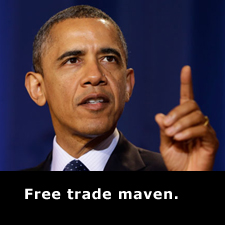We are approaching the grim milestone of twenty years after the passage of NAFTA, the North American Free Trade Agreement – a  pact that is described even by bland media outlets like NPR as having benefited only corporations in the 3 countries affected. Twenty years after its passage and signing by President Clinton, the evidence is in and it seems clear that many if not all of the criticisms were justified. And now that it is well-established and that we have entered into numerous other trade deals modeled on NAFTA, mainstream news organizations can report the obvious, namely:
pact that is described even by bland media outlets like NPR as having benefited only corporations in the 3 countries affected. Twenty years after its passage and signing by President Clinton, the evidence is in and it seems clear that many if not all of the criticisms were justified. And now that it is well-established and that we have entered into numerous other trade deals modeled on NAFTA, mainstream news organizations can report the obvious, namely:
- NAFTA has fueled immigration to the U.S. from Mexico. By forcing Mexican corn farmers, for instance, to compete with Cargill, the agreement effectively destroyed large segments of rural livelihood in Mexico, sending economic refugees streaming into their cities and ultimately across the U.S. border in a desperate bid to find gainful employment. (I might add that, coupled with the high demand from the U.S. for illicit drugs, this destruction of legitimate crop farming has likely led to greater resort to illegal agriculture, marijuana production, etc., in the Mexican countryside.)
- NAFTA has undermined employment and wages in all three countries. This is the sad truth behind Ross Perot’s “giant sucking sound” – the allure of moving production to Mexico has emptied factory towns in the United States, leaving us with the miserable husk of an economy we’ve been living through these past five years in particular.
- NAFTA has provided a pernicious model for other agreements. The Trans Pacific Partnership is just the latest in a series of NAFTA like “free-trade” – actually, investor rights – agreement that have popped up since 1994. Some have failed, like the Multilateral Agreement on Investment (MAI), which was dropped after news of its consideration became widely distributed. But generally, these pacts have contributed to a neo-imperial system of enormous corporate wealth unattached to any nation or government, pushing labor back on its heels.
The thing is, we are grappling with something more serious than a recession, and NAFTA is one manifestation of the deeper problem we face. Our basic right to earning a livelihood is under attack, and we have to be more determined in our efforts to not only defend against this attack, but to push back and press forward.
luv u,
jp
